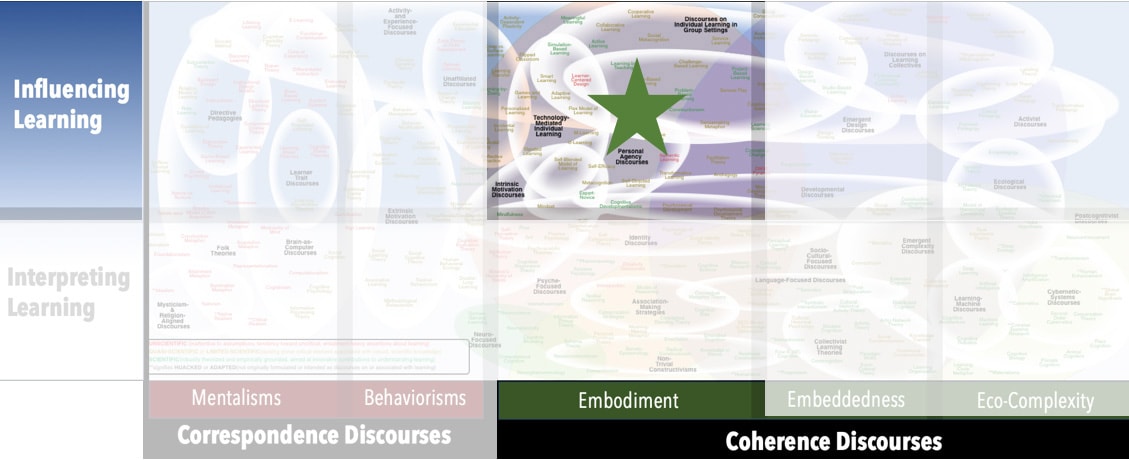Focus
Strategies and emphases to support personal meaningPrincipal Metaphors
- Knowledge is … scope of possible actions and interpretations
- Knowing is … interpreting (preferably in effective and appropriate ways)
- Learner is … an integrator (individual)
- Learning is … integrating (new details with established understandings)
- Teaching is … personalizing
Originated
1960sSynopsis
Meaningful Learning (which should not be confused with Meaningful Learning Theory) is typically invoked as a contrast to Rote Learning. Explicitly, it refers mainly the comprehensibility of the topics under study, but the term is actually used most often as an implicit reference to classroom strategies that emphasize building on established understandings, learner engagement, inquiry, and empowering learners. The core construct in Meaningful Learning is:- Meaning – most broadly, the impact of a form or event on one’s being – and, most often, the psychological significance of some mode of representing or reminding.
Many categories of Meaning have been identified, and they are often characterized as nested. Most prominently, perhaps, discussions of Meaning in language and literacy include the following categories (listed in in order from micro to macro):
- Phonetics – having to do with distinct speech sounds, including the study of human perception and production of such sounds
- Phonology – having to do with the study of sound patterns and structures
- Morphology – having to do with words – specifically, how word choice, emphasis, and pronunciation can affect a word’s meaning
- Syntax – having to do with combining words into phrases and sentences, which includes such sub-concerns as grammar, sentence structure, and word order
- Semantics – the study of meaning in language. Subdiscourses include:
- Cognitive Semantics (George Lakoff, 1980s) – the perspective that one’s language is an integral component of one’s cognitive abilities and, therefore, of the world one perceives/conceives.
- Dynamic Semantics – the view that every instance of language use (e.g., text, or chatting) provides information to be used to update the context. That is, meanings and contexts are in constant, co-evolving flux.
- Frame Semantics (Charles Fillmore, 1990s) – a perspective on the meaningfulness of language that suggests one cannot know the meaning of a particular word without knowing something of the web of associations activated/evoked/highlighted by that word
- Situational Semantics – a branch of Semantics in which it is asserted that truth is situational – that is, to assess meaning, one must attend both to the correspondence between an utterance and reality and to the situation in which the utterance is made
- Structural Semantics (Ferdinand de Saussure, 1930s) – rooted in Structuralism, the study of how meaning can emerge in the relationships among smaller elements of meaning, such as the words and grammar of a sentence
- Semiotics – the study of meaning in any symbolic system
- Rational Learning – Meaningful Learning in which “understanding” entails appreciations of both the relationships among a construct’s components and the relationship of the construct to other constructs
Commentary
Because Meaningful Learning is most often encountered as an alternative to traditional standardized education, generally, and Rote Learning specifically, in popular debates it is often clustered (unfairly) with uncritical and indefensible theories such as Discovery Learning and Learning Styles Theories. Understood for the simple message it offers, it’s difficult to dispute the importance of approaching topics in relevant, comprehensible ways. At the same time, advocates of Meaningful Learning could help to sidestep such inappropriate associations by linking their discussions more explicitly to Embodiment Discourses.Authors and/or Prominent Influences
DiffuseStatus as a Theory of Learning
Meaningful Learning is not a theory of learning, in the sense of a perspective that offers insight into the complex dynamics of cognition.Status as a Theory of Teaching
Meaningful Learning is perhaps best interpreted as a moral statement on appropriate emphases within formal education. It is a specific stance on the matter of how concepts should be encountered in schools. However, it would be inappropriate to call it a theory of teaching.Status as a Scientific Theory
There has been a considerable research contrasting Meaningful Learning and Rote Learning. As might be expected, Meaningful Learning is associated with better attitudes, longer retention, transferability of learning, and other desirable effects. However, since it’s a practice rather than a perspective, it would be inappropriate to classify Meaningful Learning as scientific.Subdiscourses:
- Cognitive Semantics
- Dynamic Semantics
- Frame Semantics
- Meaning
- Morphology
- Phonetics
- Phonology
- Rational Learning
- Semantics
- Semiotics
- Situational Semantics
- Structural Semantics
- Syntax
Map Location

Please cite this article as:
Davis, B., & Francis, K. (2023). “Meaningful Learning” in Discourses on Learning in Education. https://learningdiscourses.com.
⇦ Back to Map
⇦ Back to List
